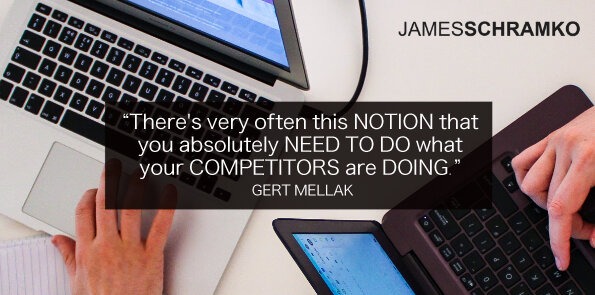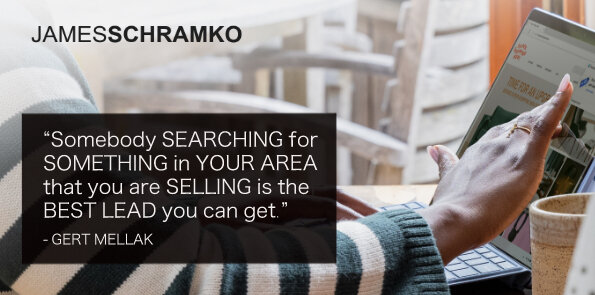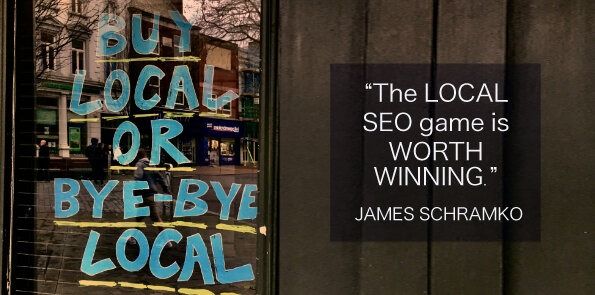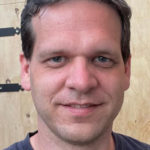Podcast: Download (Duration: 37:33 — 35.1MB)
Get Notified Of Future Episodes Apple Podcasts | Spotify | Amazon Music | Android | Blubrry | Gaana | TuneIn | Deezer | Anghami | RSS | More
Amidst the buzz around paid traffic, AI, and other digital trends, James and guest Gert Mellak agree: SEO is still important. Gert in fact suggests that with the rise of AI, SEO is more crucial than ever, as AI relies on well-structured content to provide accurate answers.
Episode 1033 focuses in particular on local business SEO, or the benefits of SEO for local businesses.
James and Gert will shed some light on why local SEO matters.
They’ll talk about how businesses can optimize SEO for local visibility.
And they’ll discuss which businesses can best reap the advantages of local SEO.
Table of contents
1. A sample of how local SEO works
2. Who this episode is for
3. The difference SEO could make
4. Where many businesses fall short
5. How Gert actually helps these businesses
6. Taking the retail approach
7. Do you stand a chance against the big guys?
8. Are people just too busy with other stuff?
9. The benefits of focus
10. Do Google reviews play a part?
11. Advice for two types of listeners
A sample of how local SEO works
James shared a relatable shopping story. After buying shoes at a local branch of a big chain, he went online, hunting for another color. There he stumbled upon local sellers he didn’t even know existed. He wonders aloud to Gert, could these local stores be doing something to come up on search even before big brands?
Absolutely, says Gert. He offers some interesting info: nearly half of all Google searches are people looking for stuff locally. It could be anything – a late-night pizza place, the nearest mechanic, or simply checking when the vet closes.
Google is top of this, making sure people see local options first. And the real kicker, these local searches, about 80% of them, often lead straight to a sale.
Gert drops some advice – even big brands should think local online. Because having a local online presence can make a big difference in reaching customers right in their neighborhood.
Who this episode is for
Given the topic, says James, who should listen to this podcast episode? Might national or e-commerce brands benefit more than local brands typically fixated on social media?
Gert says the episode’s insights are universally valuable. Leads from Brazil, for instance, are targeting Spanish SEO services like his own. Regardless of what one sells, consumers frequently search with a local focus, even if they’re ultimately open to purchasing from distant providers.
The difference SEO could make
James shares another recent shopping experience, where he bought from a local camera store over Amazon, simply because of immediate availability.
Although James prefers to shop locally, he notices these local businesses often aren’t easily found in online searches. He ponders if, with improved SEO, these stores could be more visible to consumers looking for their products.
Gert confirms this: businesses can benefit hugely from optimizing their online presence for local searches. Many businesses pay a premium for physical locations with good foot traffic, but might neglect their online visibility.
By emphasizing their local nature – often seen as a drawback, but truly a strength – they can better compete in online searches against national brands and giants like Amazon.
Where many businesses fall short
Gert stresses a common oversight among local businesses: not enough use of digital marketing.
While some businesses might have rudimentary Facebook ads or occasional posts, they often lack in-depth tracking and analysis. The result: they are unaware of the effectiveness of their digital marketing efforts and can miss opportunities for customer engagement and sales.
Gert had a client who thought a “working” website meant it was simply online and functional. There’s a difference, says Gert, between functionality and effectiveness.
Many businesses, he notes, lack basic awareness of their website traffic sources, leading them to possibly waste money on ineffective strategies.
Addressing this gap, Gert says the initial approach they take is to coach local businesses. By setting benchmarks, providing data dashboards, and ongoing education about different digital channels, businesses can become more informed and make strategic decisions to enhance their online presence and customer engagement.
How Gert actually helps these businesses
Gert’s approach to assisting businesses is anchored in data-driven strategies. When a business approaches him, he starts by helping them recognize the gaps in their current digital strategy. By introducing them to tools like dashboards, Gert allows businesses to understand and monitor their online metrics, which can be transformative for those who previously operated mostly offline.
A significant part of the process is correcting misaligned SEO strategies. Gert often encounters businesses that rank for outdated or irrelevant keywords. By targeting these discrepancies, businesses not only become more efficient in attracting the right audience but also understand better why certain queries are made about their offerings.
It’s especially important, says Gert, that businesses be open to change. He often asks clients to track foot traffic and purchases in their physical stores to determine conversion rates. By integrating both offline and online data and adjusting based on these insights (like modifying store displays or billboards), businesses can achieve significant growth and greater engagement with customers.
Taking the retail approach
James highlights the importance of the retail approach, remembering his days running a Mercedes-Benz dealership. Over 25 years ago, they used a system similar to that of the movie “Moneyball,” meticulously tracking every visitor’s details. This daily data collection, though rudimentary, was quite effective.
For businesses today, James believes the initial step is understanding one’s current position via mechanisms like an SEO audit.
Gert likens the approach to starting a gym regime, beginning with a comprehensive checkup to understand one’s starting point.
Do you stand a chance against the big guys?
Gert believes that local businesses can actually compete with major corporations. Going against giants like Amazon or Target can seem daunting, but these corporations often neglect the local level, giving local businesses an opening to shine through personalized customer service and direct customer access.
By capitalizing on these strengths and genuinely embracing opportunities, many local businesses can exceed expectations, as seen with various clients Gert has helped across different industries.
These businesses have achieved immense growth and success, even in the face of larger competitors. The key, according to Gert, is to understand what platforms like Google prioritize: providing quality, relevant results to searchers. When someone is looking for a local provider, the best search result is often a local business that can offer the requested service or product.
James reflects on the evolution of online marketing. In 2008, his clients dominated Google search results through a comprehensive strategy. Now, with more businesses adopting online marketing practices, the digital landscape has become more competitive. Companies now utilize multiple channels and strategies, making it essential for businesses to stay updated and innovative in their approach to stand out.
Are people just too busy with other stuff?
James wonders if the allure of new social media platforms and trends distracts businesses from more established marketing strategies.
Gert observes that local businesses often shift strategies based on what competitors are doing, sometimes to their detriment.
For instance, a store that had a successful search marketing campaign diverted all its efforts to TikTok after seeing a competitor’s success on the platform. Now, while they do receive leads from TikTok, it’s not as consistent, and it demands more effort, such as daily video creation.
Gert emphasizes the value of leads generated from active searches for local services or products, suggesting it’s among the best types of leads a business can gain.
The benefits of focus
James and Gert discuss the benefits of niche marketing and specialization.
Gert highlights the advantages of businesses narrowing their focus, taking, for example, a car repair shop that specialized in gearboxes. By honing in on this niche, the shop was able to successfully set up targeted Google ads and SEO campaigns, quickly yielding tangible results.
Gert believes this focused approach helps businesses stand out in a saturated market and lets them be seen as authorities in their specialized areas. By positioning themselves as experts, businesses can gain the trust and attention of platforms like Google, leading to better rankings and visibility.
James points out the power of reputation and word-of-mouth marketing, especially in local communities. Using the example of local Facebook groups, James notes how businesses that are consistently recommended by community members naturally grow their reputation and become go-to solutions for specific services in the area.
He also speaks from personal experience, mentioning how he chose his pool maintenance service based on local recommendations and their organic ranking on Google’s first page.
Organic listings paired with good reviews, says James, add a layer of trustworthiness. Before making a decision, James often checks both the best and worst reviews of a business to get a comprehensive understanding of their service quality.
Do Google reviews play a part?
What significance, if any, do Google reviews have in local SEO, asks James?
Google reviews play a pivotal role, says Gert, in improving a business’s online visibility. Registering on Google business profiles, uploading photos, and actively seeking reviews from satisfied customers can boost a business’s online presence.
Gert emphasizes that genuine user feedback holds substantial weight, as Google can differentiate between legit and fake reviews. Google’s can actually track users’ locations through their phones, allowing them to verify the legitimacy of a review by checking if a user has physically visited the place they reviewed.
There are instances, says Gert, where people have tried to manipulate Google’s system by creating traffic jams or using multiple phones, but he advises to avoid such shortcuts and focus on gathering genuine feedback.
James underscores the need to regularly engage with customers and request feedback to benefit from local SEO. He himself is more than willing to leave a positive review when asked, after a positive service experience.
Advice for two types of listeners
James proposes closing with local SEO strategies for two types of businesses – local businesses looking to optimize, and e-commerce stores wanting to gain customers from different regions.
For e-commerce stores trying to target different regions, Gert suggests using the Google Search Console to analyze keyword queries associated with specific locations. By identifying low-ranking keywords relevant to their products or services, businesses can then create dedicated pages or articles, potentially increasing their ranking within weeks.
For local businesses, Gert stresses the importance of truly showcasing their local presence. Instead of aiming to look like a large national entity, businesses should embrace their local identity. This includes prominently displaying their address, showing maps, and integrating content always back to their location and product. Such consistency ensures that search engines, through their AI models, learn to associate the brand with its specific offerings and location, providing a solid foundation for future SEO strategies.
Has Gert got any tools or checklists to help businesses audit their local SEO practices? Gert mentions a ‘quick wins analysis’ that his team offers. Instead of a general checklist, this analysis provides a custom report after thoroughly examining a website’s SEO aspects. As a special offer, Gert can provide this typically $100 service for free to listeners of James’s podcast, if they reach out in 2023.
James can vouch for Gert’s expertise, and highly recommends his services. You can find Gert and his team at SEOLeverage.com.
Liked the show? Enjoy all the episodes when you subscribe on iTunes













Leave a Reply